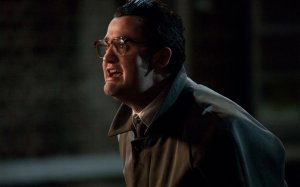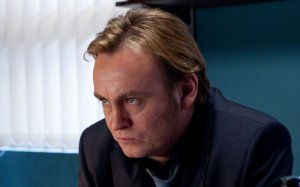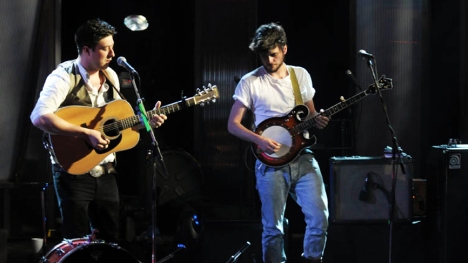The other day, I found myself analysing the person in front of me in a Sherlock Holmes style. Sherlock, that is, in 2010. “Hm.. Sporting a blue plaster? Works in the catering industry. Chavy clothing though. Works in a chain pub. He’s carrying.. Knives?! Well he’s illegal but he clearly cares about his profession. Taking knives home to sharpen them..?” As I passed this chap on the street, I realised he was foreign – which was clearly my one great mistake. He was probably a brilliant chef but no one here would give him a chance.
Huge, probably wildly inaccurate, assumptions.
But yes, the point is ‘Sherlock’ is addictive and makes you want to be a consulting detective. Really. He makes detecting cool. And it must be so much fun acting the analysing scenes – the greatest moments of his career centres around making everyone else look incredibly thick because Sherlock can work out the hugest facts on the tiniest details. I WANT TO DO THIS.
‘Great Games’ reminded me of the 1939 Sherlock Holmes (with Basil Rathbone), ‘The Adventures Of-‘, which is a fantastic watch really. The main idea was that there were many small puzzles for Holmes to solve, whilst one huge one that he didn’t think was that important was going on in the background. Rookie mistake Holmes. This episode was also the first proper introduction of Moriarty, and it didn’t disappoint.
It starts with Holmes being bored in Baker Street, without a case to solve. He is disappointed with the criminals of London. After a gas-explosion, Mycroft visits and tries to persuade his brother to investigate the death of a MI5 employee, Andrew West, who was in possession of some highly important information. Holmes says no.
But then Sherlock is called to Scotland Yard, where he is given a package containing a pink mobile phone, similar to the one in ‘A Study In Pink’. A message on the phone is a recording of the Greenwich Pips – presumably an updated version of ‘The Five Orange Pips’ – and soon Sherlock starts receiving calls from unsuspecting members of the public who have had explosives strapped to them. These people give Holmes a number of hours in which to solve a puzzle, and if he doesn’t solve them, the explosives on the victim are detonated.
Case One involves Carl Powers, a boy who was drowned in a swimming pool in 1989. Being interested in the case at the time, but underage, Holmes was unable to do anything about it, but now a picture of 221C Baker Street (the basement flat of his building) is sent to his new pink mobile, and the trainers of Carl Powers sit there. Through analysing the trainers, Holmes solves the first case by detecting that Powers was poisoned through his eczema medicine – Case One is solved, and Victim One is saved.
Case Two – another photo message is sent to the pink mobile, this time of a car. When the car is found, a quantity of blood is discovered in it, and the assumption is made that the owner of the car, Ian Monkford, has died. But that is what we are supposed to believe – after Holmes finds a card for a rental service in the glove compartment, and talking to his ‘widow’, and analysing the clues, Sherlock discovers that Mr Monkford used the rental service to help him disappear, and set up a new life in Columbia. Job done.
Case Three involves a TV personality and make-over host, Connie Prince, who has died from a tetanus. Although it suspected she cut herself on a nail, Holmes blows this theory out of the proverbial water by pointing out the wound was made after death, and that it was Connie Prince’s housekeeper Raoul (how cliché…) who had poisoned her Botox injections to murder her. Holmes solves the case in time, but as Victim Three starts describing the perpetrator during her call to Holmes, the building she is in is blown up, and twelve people die. That Moriarty bastard.
Case Four – Alex Woodbridge. This was a particularly good one, and a photo of the Thames is sent to Holmes, via the pink phone. Checking the high and low tides, Holmes finds a body that has been lying under the water, and after a quick glance at the victim, he can tell Lestrade and Watson where he works and why he has been killed – a supposedly lost painting, worth £3 million, has been discovered and is to be unveiled at the museum that the dead man works at. Clearly the dead man knew, and so he had to die. OUTSTANDING analysis from Holmes here, who has about ten seconds to solve the case – or a child dies. He realises that a star, discovered in 1858, is painting into the picture. If this picture is supposed to be genuine, it cannot have been painted in the 1640s. Child survives. 1-Up Holmes.
Case Five – we are back to the underlying story of Andrew West, the murdered MI5 employee. After breaking into his brother-in-law’s flat and confronting him, said brother-in-law confesses and tells them about owing money to drug dealers, and how the important information that Andrew West was possessing could help him out of his debts. The death of West was an accident, and the information is reclaimed.
The episode ends in a stand-off between Moriarty and Holmes, at the swimming pool that Carl Powers died in (how sick). As his victim this time, Moriarty has Watson. Ouch. A discussion between whose mind is better ensues, and the scene ends with lasers from snipers on both Holmes and Watson, and Holmes trying to decide what to aim at with his gun – Moriarty or Watson’s explosive vest?
WHEN WILL THE NEXT SERIES BE?! Hurry up yes? Good.
Filed under: Literature, Television | Tagged: Doctor Watson, Inspector Lestrade, Professor Moriarty, Sherlock Holmes, Sir Arthur Conan Doyle, The Great Game | Leave a comment »































